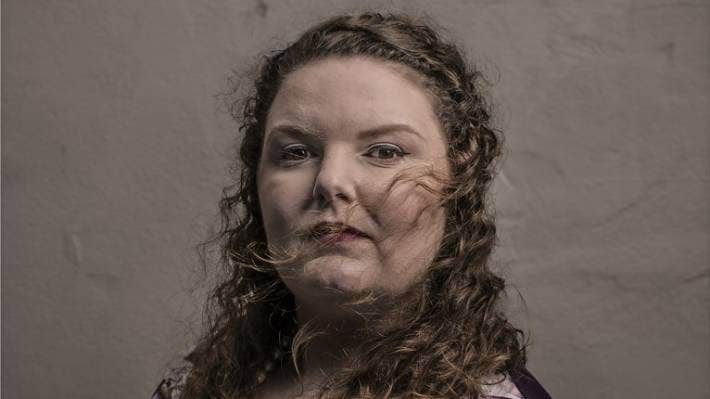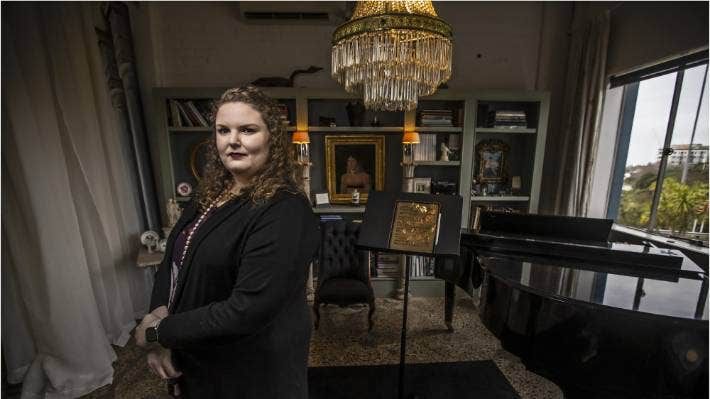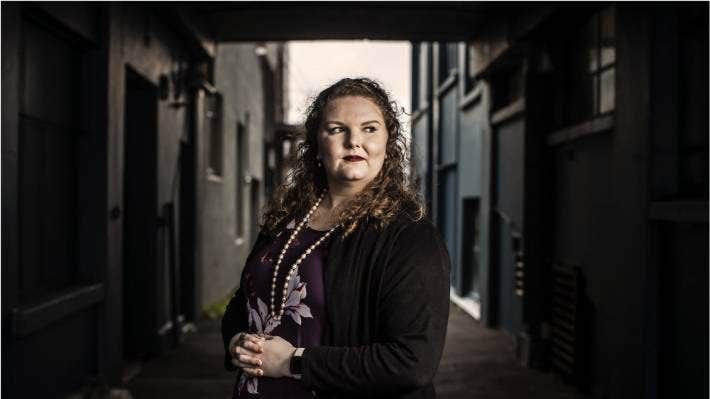Opera talent lost her voice after long Covid
- 8 August 2022
A battle with long Covid robbed soprano Christina Orjis of her singing ability, before a breathing specialist helped to get her health and career back on track.

Soprano Christina Orjis says she struggled to breathe and, when tested, ended up with only 20% of a normal person's lung function and capacity.
The 31-year-old Auckland-born performer has endured a nightmare ordeal after contracting Covid-19 while studying in Manchester in early 2020. She relapsed seven months later with long Covid symptoms that left her bedridden for nine months and unable to sing for a year.
“I struggled to breathe and, when tested, ended up with only 20% of a normal person’s lung function and capacity,” Orjis says.
“I also struggled with an excessively high heart rate, which affected my energy and made me feel very fatigued and sometimes quite dizzy.”

Having fallen in love with singing at 7, Christina Orjis struggled without being able to practise or perform.
The illness forced Orjis - who returned to New Zealand to ride out the uncertainty during the early stages of the pandemic - to defer the second year of her Master’s degree at Manchester’s Royal Northern College of Music, which she is now looking forward to completing upon returning to England in September.
“I felt like I wasted a year of my life. I kind of slept my life away,” she says.
“In the worst period of it, all I would do is get up to eat and then sleep the rest of the time, and I couldn’t do anything.
“After that I wished I could do something, but I just didn’t have the energy or the will.”
Breathing difficulties meant Orjis’ misery was compounded by being unable to sing, and she required extensive help from an in-demand breathing specialist as part of a drawn-out recovery that is a work in progress.
Having fallen in love with singing at 7, Orjis struggled without being able to practise or perform.
“It was kind of a double whammy because [that was] the hardest thing. That’s the longest period of time I’ve ever gone without singing,” she says.
“I am no longer seeing a breathing specialist, but it doesn’t mean that the work has stopped. She’s confident that I know what I’ve got left to do and that I can do that by myself. But if I get into any trouble, I can email her.

A breathing specialist helped Christina Orjis get her health and career back on track.
“She’s now very busy with people who have had Covid. So considering that she didn’t have to see me, [it has] freed up spots for people who were more desperate.”
“Having lost a year of my life, I don't want to lose any more to Covid, hence why I’m heading back over [to Manchester],” she says.
“But I am still very careful. There are mitigations you can do to make sure that you know that you're not catching it.”
“I would love to see masks being reintroduced [indoors] and even [a] push for negative Rat tests for more [events],” she says.
“People would still go to a concert even if it was pop music, or whatever, if they just had to wear masks and produce negative RATs.”
Now healthy enough to resume singing, this month Orjis has performed with the New Zealand Opera Chorus in the Verdi Requiem and with the Auckland Philharmonia Orchestra at the Town Hall in Verdi’s Il Trovatore.
In December, she will play the lead role of Rosalinde in the Die Fledermaus opera in Manchester, after submitting a video audition from her home on Auckland’s North Shore.
“That’s been really encouraging. That makes me realise that I haven’t actually lost anything from being here. I haven’t stagnated. I’ve still been able to move forward, which is really great.”
’If people learn how to breathe with their nose or diaphragm, it helps them in their recovery’
When Orjis found herself suffering from long Covid, she sought help from respiratory physiotherapist Brooke Peirce to learn how to breathe again.
And she is not the only one. Auckland-based Peirce has noticed an increase in the amount of long Covid sufferers she has been seeing over the past few months. Those clients are varied – from athletes and business executives to students and tradespeople.
While their symptoms may differ, Peirce says a respiratory physiotherapist can help with a variety of long Covid symptoms.
As a respiratory disease, many sufferers present with symptoms such as shortness of breath, a chronic cough or “increased lung secretion”.
While Peirce works with clients to help with those respiratory symptoms, she also has a number of people seeking help with brain fog and fatigue as well.
“In that situation [treatment is] more based around relaxation or pacing. People need to learn how to pace their activity,” she says.
For many long Covid sufferers, Peirce’s work is largely focused around “breathing pattern retraining”. Many people breathe through their mouth, rather than nose, which leads to inefficient breathing.
“It uses up a lot of energy or can create anxiety as well. If people learn how to breathe with their nose or diaphragm, it helps them in their recovery,” she says.
And it is not just long Covid that respiratory physiotherapists are helping during the pandemic. Peirce works with a number of sportspeople, including professional and Commonwealth Games athletes, who seek treatment for recovering from a single case of Covid-19.
“That treatment is mostly around strengthening the breathing muscles and doing respiratory co-ordination drills. Just trying to get them to improve their ability to ventilate appropriately for their sports,” she says.
When it comes to athletes and Covid recovery, Peirce utilises an “inspiratory muscle trainer”. It is a device that allows the client to breathe against resistance.
“It’s kind of like a dumbbell for your diaphragm. You start at a certain resistance and turn it up, so it gets harder.”
How to breathe
Breathing is the most natural thing we do as humans, but Peirce says many of us do not breathe efficiently. And inefficient breathing can have a significant number of adverse effects.
“Because it’s so fundamental, it impacts us in a multi-system way,” she says, adding that breathing incorrectly can impact lungs, levels of oxygen, brain function, heart rate, blood pressure and digestion.
“It’s just so multi-system that so many things can go wrong when you don’t breathe well. It really does affect people in multiple different ways,” she says.
Inefficient breathing can also affect people’s anxiety levels, Peirce says. This primarily comes from breathing through the mouth, rather than the nose.
“When you mouth breathe you can tend to use your upper chest a lot more. There’s a more direct route to chest breathing when you mouth breathe,” she says. In short, mouth breathing can result in an increased breathing rate, which can cause a number of physiological changes.
“It can change the levels of CO2 in your blood, and it can also increase the amount of sympathetic nervous activity.”
That autonomic nervous system is how the body controls all the things that happen without you realising it, she says. Shallow and quickened breathing affects the nervous system which, in turn, can cause anxiety.
“The sympathetic nervous system is associated with feeling more anxious and looking out for threats – your threat perception is much more heightened. Physiologically, with the CO2 that can create a change in the pH in your blood, which can also physiologically bring on feelings of anxiety,” she says.
While understanding that breathing properly helps is one thing, how do people ensure they are? Peirce says that it is largely a matter of getting a couple of basics right.
Of the highest importance, she says, is breathing through your nose.
“Breathe down into your diaphragm. Use your nose, rest your chest,” she says, adding you shouldn’t see major chest movements when breathing.
“And when you're at rest, try to practise some relaxation. A daily practice of giving your body an opportunity to relax, not sitting in front of a screen but just spending time going through relaxation or nose belly breathing when lying down,” she says.
And you don’t need much to make a difference. In fact, just 10 minutes a day will help.
Stuff, David Skipwith, Jul 27 2022
